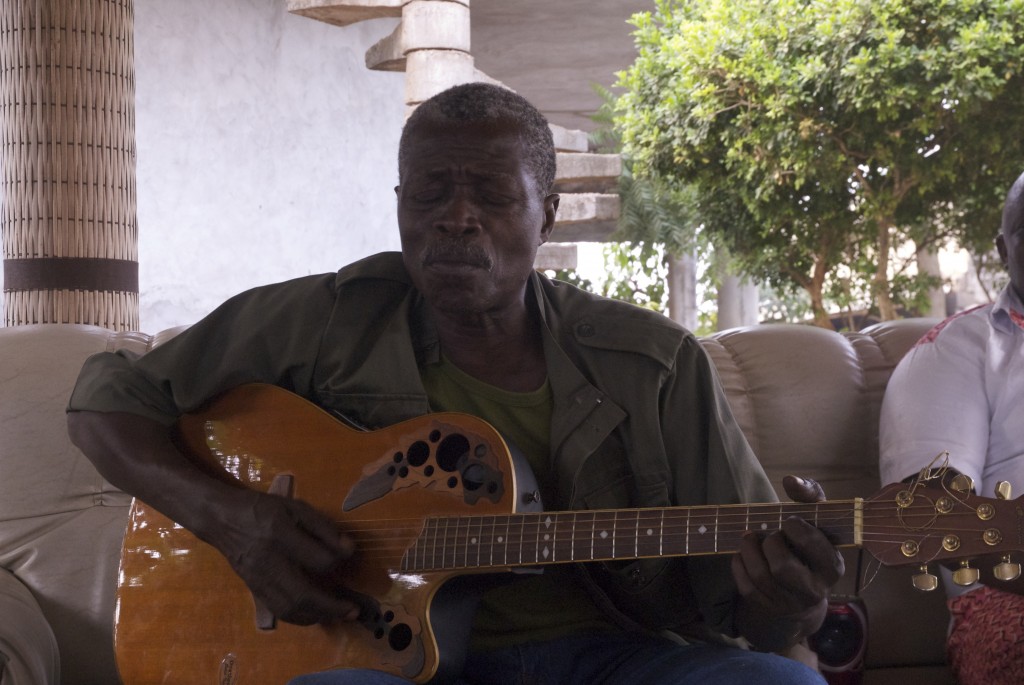Blog January 22, 2015
Field Report: In Benin, At Home With Sagbohan
Producer Morgan Greenstreet is currently in West Africa, checking in on the scene, and talking to some of our favorite musicians. In his last report, he wrote about hanging out with FOKN Bois' Wanlov the Kubolor in Accra. We will feature more of his reports in the future.
Martial Ahouandjinou returned to the art gallery that serves as Gangbé Brass Band's rehearsal space, laughing. He turned to me and Sarah Politz, an American doctoral student and trombonist who has spent years in Benin, studying and playing with local musicians. "That was Sagbohan who called. He said he's hungry, he wants to eat, but he's waiting for us."
Martial, a round, jolly man, is an excellent trombonist, and the current musical director of the groundbreaking vodun-jazz roots group Gangbé Brass Band. Martial comes from a renowned family of musicians: His father, Henri "Caima" Ahouandjinou, was the director of the Orchestre National de la Gendarmerie, the police orchestra in Porto-Novo. He studied music and music theory in France, and he passed the knowledge to his sons, all of whom are professional musicians. Martial also plays with Sagbohan Danialou, who is one of the pioneers of "modernized traditional" music, a powerful singer, composer and master drummer on the drum set, the congas, or the traditional kpahwle drum. Sagbogan is also notoriously reclusive and unpredictable, but Martial promised to take us to meet "Papa" today. So he cut rehearsal short, and we rushed off to find a taxi to Porto-Novo.
We arrived an hour and a half later. The taxi pulled up a dirt road and stopped before a red gate. Inside, we approached a veranda-like covered space with a low table surrounded by lounge chairs. In the center of the space, leaning forward on a long white couch, was a tall, wiry man with graying hair, whom I recognized instantly. Three other men sat around him. There was a deck of cards on the table and the air was clouded with cigarette smoke.
Sagbohan stood to greet us, offering us seats and, of course, sodabi--strong local gin--from a large bottle stuffed to bursting with medicinal herbs. "This is a medicine for the aging men, like myself," he explained. "It is good for the health of the prostate. This plant inside, we grow it here in the yard." He sent one of the men to pick leaves from the plant to show us. It was just such a bottle that had poisoned Sagbohan and his eldest son, Djibril, last year, leaving the son dead and the father in the hospital. We didn't talk about that.
Sagbohan fiddled with a small portable radio with a flash drive connected. With rapt attention, he listened to '80s Santana, then smooth-jazz versions of Bob Marley songs, then a lounge crooner. Then he stood abruptly and went into his house. He returned with a guitar and began tuning. Seizing the moment, I introduced myself as a music journalist, and handed him a copy of the Afropop radio program I had produced in 2013, "Benin: Transforming Traditions," which features some of his music. I asked if I could record when he wanted to sing.
[caption id="attachment_22552" align="alignnone" width="640"]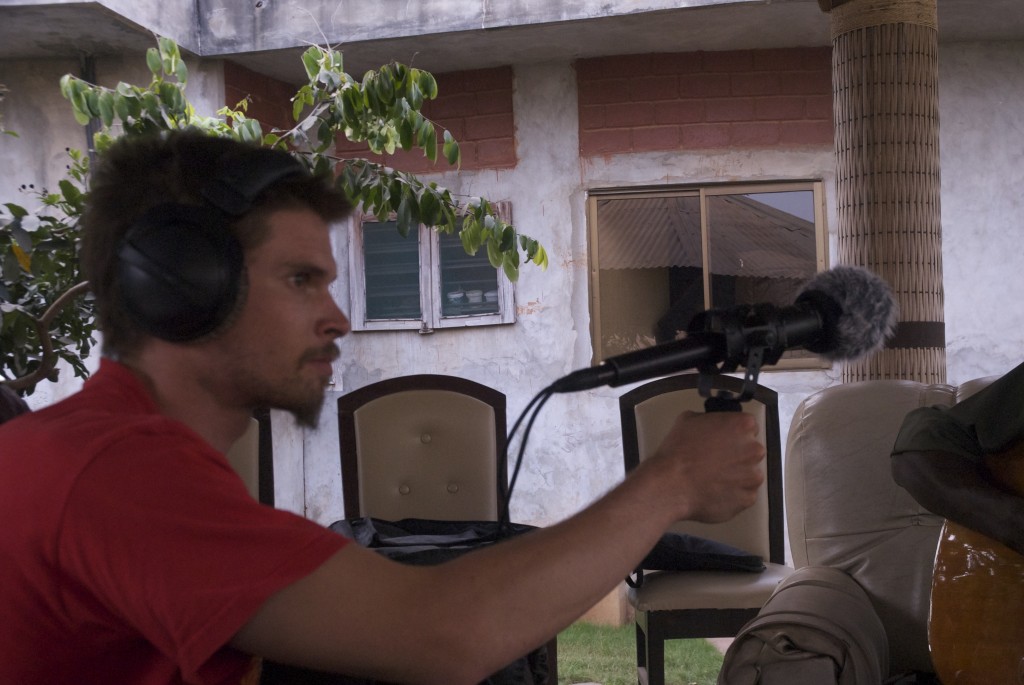 Producer Morgan Greenstreet [Photo Credit: Sarah Politz][/caption]
He frowned, "Singing is better after eating and drinking, right? So maybe after we eat." But then he strummed his guitar, closed his eyes and began to sing. One of the men accompanied him by tapping a lighter on the ashtray, which was made from a section of the large bamboo also used for kaka, a traditional music of the Porto-Novo region, which Sagbohan is famous for "modernizing." His husky voice rose above the simple, rhythmic chords. His voice had a quiet, intense power, like a spiritual call. As he sang, eyes tightly closed, front lip out, the other men joined in the chorus. When he finished the song, we all applauded.
"That's a new song, still unsung! The song is about cotton," Sagbohan explained. "Nowadays, in Benin, everyone is crazy about cotton, it is the principal export of the country. Everyone wants to grow cotton, because that's where the money is. But my song says, 'We can't eat cotton. What will we eat if we only grow cotton? We must continue to farm the food that nourishes us, the maize, the cassava, the tomatoes...'"
[caption id="attachment_22554" align="aligncenter" width="640"]
Producer Morgan Greenstreet [Photo Credit: Sarah Politz][/caption]
He frowned, "Singing is better after eating and drinking, right? So maybe after we eat." But then he strummed his guitar, closed his eyes and began to sing. One of the men accompanied him by tapping a lighter on the ashtray, which was made from a section of the large bamboo also used for kaka, a traditional music of the Porto-Novo region, which Sagbohan is famous for "modernizing." His husky voice rose above the simple, rhythmic chords. His voice had a quiet, intense power, like a spiritual call. As he sang, eyes tightly closed, front lip out, the other men joined in the chorus. When he finished the song, we all applauded.
"That's a new song, still unsung! The song is about cotton," Sagbohan explained. "Nowadays, in Benin, everyone is crazy about cotton, it is the principal export of the country. Everyone wants to grow cotton, because that's where the money is. But my song says, 'We can't eat cotton. What will we eat if we only grow cotton? We must continue to farm the food that nourishes us, the maize, the cassava, the tomatoes...'"
[caption id="attachment_22554" align="aligncenter" width="640"]![Sagbohan Playing Guitar [Photo Credit: Sarah Politz]](https://afropop.org/migrated-uploads/2015/01/DSC0015-1024x685.jpg) Sagbohan Playing Guitar [Photo Credit: Sarah Politz][/caption]His phone rang, and he scowled. "I have to turn this thing off!" He passed the phone to a young man who had introduced himself as Pidio, Sagbohan's press agent.
"Tell them I'm at the market." Then, turning to me, Sagbohan said, "Having too many children is a problem! They always disturb me."
Pidio took the phone. "Yes, hello? Papa is working, please call back later."
Just then, a woman's voice called outside, a clear, song-like shout. "Ablooooo!" Sagbohan's eyes lit up with child-like excitement and he jumped up, "Hey! Ablo yoki!" He sent Martial running outside to buy some, and started singing a joyful song, "Je veut manger ablo yoki" ("I want to eat ablo yoki. "). "This was our traditional bread here in Dahomey-Benin, made from cassava," he said. "You can't find this in Cotonou anymore, only here, and in the village."
He passed out the small, dense morsels wrapped in banana leaves, and a few bags of roasted peanuts. "This is just the appetizer. It's eaten with peanuts! That's part of it." We blew the red husks off the roasted peanuts and chewed the dense ablo.
Sure enough, the appetizer was followed by two main courses: rice with a light chicken stew and then akpa and a palm-nut soup with chunks of chewy local cheese and chicken, served with baguettes and Bordeaux. "My chef used to be the head chef at a hotel," Sagbohan boasted. "When he retired, I brought him here." The meal was worthy of boasting.
[caption id="attachment_22555" align="aligncenter" width="640"]
Sagbohan Playing Guitar [Photo Credit: Sarah Politz][/caption]His phone rang, and he scowled. "I have to turn this thing off!" He passed the phone to a young man who had introduced himself as Pidio, Sagbohan's press agent.
"Tell them I'm at the market." Then, turning to me, Sagbohan said, "Having too many children is a problem! They always disturb me."
Pidio took the phone. "Yes, hello? Papa is working, please call back later."
Just then, a woman's voice called outside, a clear, song-like shout. "Ablooooo!" Sagbohan's eyes lit up with child-like excitement and he jumped up, "Hey! Ablo yoki!" He sent Martial running outside to buy some, and started singing a joyful song, "Je veut manger ablo yoki" ("I want to eat ablo yoki. "). "This was our traditional bread here in Dahomey-Benin, made from cassava," he said. "You can't find this in Cotonou anymore, only here, and in the village."
He passed out the small, dense morsels wrapped in banana leaves, and a few bags of roasted peanuts. "This is just the appetizer. It's eaten with peanuts! That's part of it." We blew the red husks off the roasted peanuts and chewed the dense ablo.
Sure enough, the appetizer was followed by two main courses: rice with a light chicken stew and then akpa and a palm-nut soup with chunks of chewy local cheese and chicken, served with baguettes and Bordeaux. "My chef used to be the head chef at a hotel," Sagbohan boasted. "When he retired, I brought him here." The meal was worthy of boasting.
[caption id="attachment_22555" align="aligncenter" width="640"]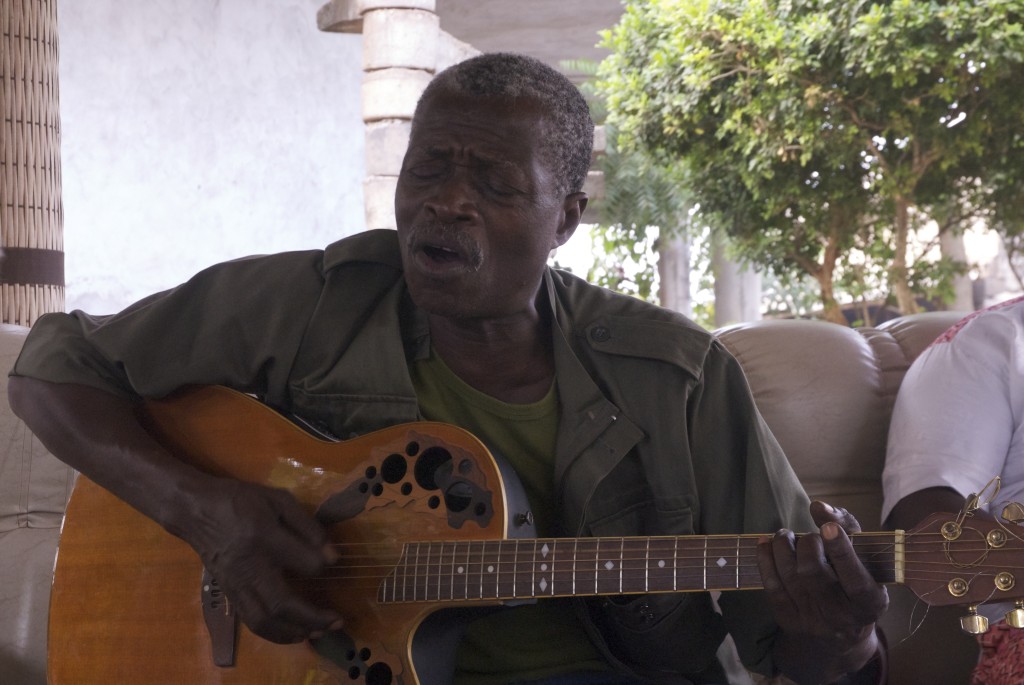 Photo Credit: Sarah Politz[/caption]
The dishes were cleared, the table empty, and the time for leaving was fast approaching, yet we had not conducted the interview that Sarah and I had come for. We wanted to know how Sagbohan had "modernized" traditional rhythms, adapting them to the drum kit; we wanted to know what it was like being a young musician in the '60s and '70s in Benin. But Sagbohan was enjoying himself, holding court from his white couch, as king and jester at the same time:
"What is eight divided by two?"
"Four."
"No! Either three or zero! That's the mathematics of the street! Divided in two, cut in two, you see?" He laughed, rolling sideways on the couch, sitting up to refill his wine glass.
Finally we asked him if we could begin the interview, and he gladly obliged. He even sang more songs, not the new, "unsung" one, but songs from his repertoire, which I recorded. Check for them in an upcoming episode of Afropop!
[caption id="attachment_22556" align="aligncenter" width="640"]
Photo Credit: Sarah Politz[/caption]
The dishes were cleared, the table empty, and the time for leaving was fast approaching, yet we had not conducted the interview that Sarah and I had come for. We wanted to know how Sagbohan had "modernized" traditional rhythms, adapting them to the drum kit; we wanted to know what it was like being a young musician in the '60s and '70s in Benin. But Sagbohan was enjoying himself, holding court from his white couch, as king and jester at the same time:
"What is eight divided by two?"
"Four."
"No! Either three or zero! That's the mathematics of the street! Divided in two, cut in two, you see?" He laughed, rolling sideways on the couch, sitting up to refill his wine glass.
Finally we asked him if we could begin the interview, and he gladly obliged. He even sang more songs, not the new, "unsung" one, but songs from his repertoire, which I recorded. Check for them in an upcoming episode of Afropop!
[caption id="attachment_22556" align="aligncenter" width="640"]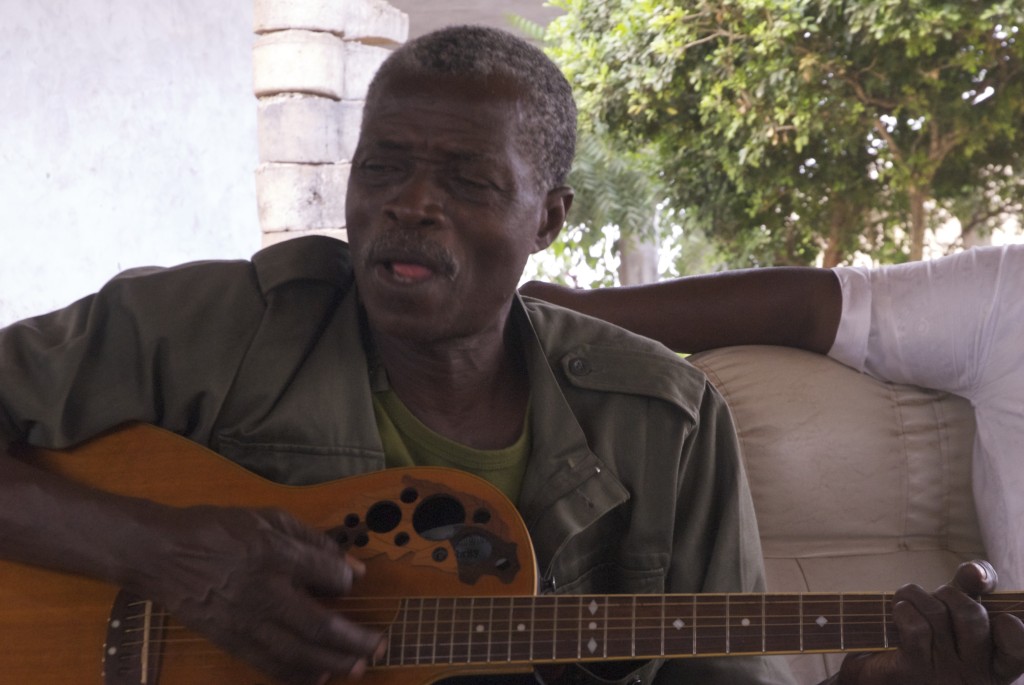 Photo Credit: Sarah Politz[/caption]
When Sagbohan finished singing, the drummer who accompanied on the ashtray laughed, saying, "We always learn from you."
"Ah, you learned something today? Good, that's the traditional way."
"When we come here, we always learn something. That song, we've never heard it sung in that way before."
[caption id="attachment_22557" align="aligncenter" width="640"]
Photo Credit: Sarah Politz[/caption]
When Sagbohan finished singing, the drummer who accompanied on the ashtray laughed, saying, "We always learn from you."
"Ah, you learned something today? Good, that's the traditional way."
"When we come here, we always learn something. That song, we've never heard it sung in that way before."
[caption id="attachment_22557" align="aligncenter" width="640"]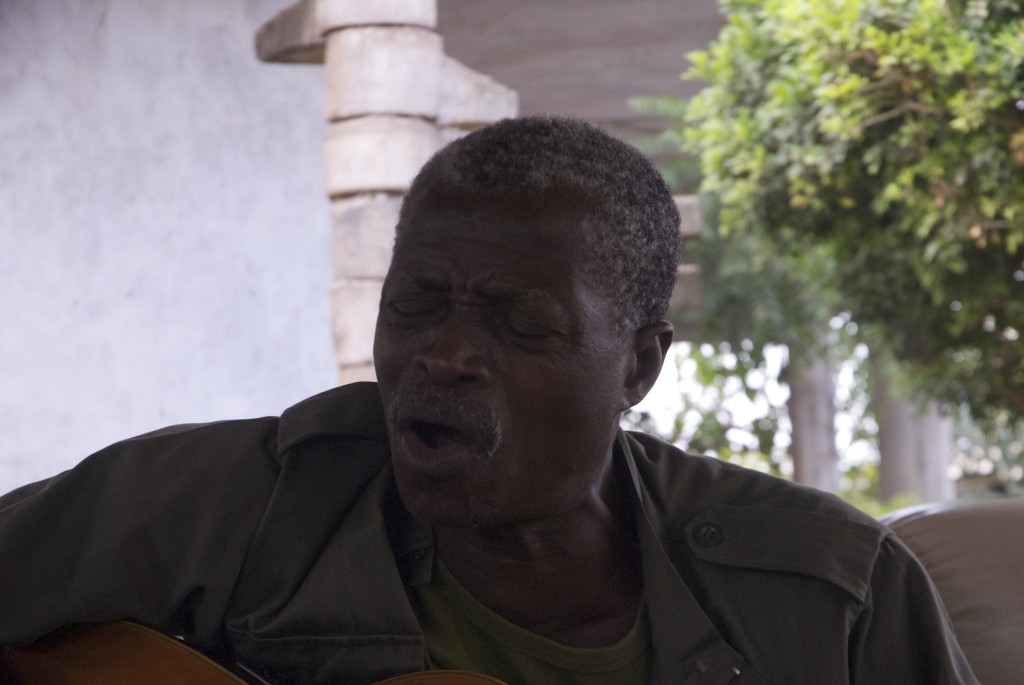 Photo Credit: Sarah Politz[/caption]
Martial sat down next to Sagbohan on the couch, and addressed me and Sarah:
"This is very important! I thought I knew how to play, but when I started playing with him... I was small when I started with him, he's my father. I thought I knew how to play, but when I came to him, I learned so many things, on piano and trombone. And every day, any day you come here, you learn something! Honestly, we have a library, a musical encyclopedia here! This monsieur is our boss! We need to press him like..."
"Like an orange," said Sarah.
"More like a lemon," Sagbohan responded with a smile. "Honestly, modesty aside, when I'm with you musicians, I feel a bit above you in the profession. So I have the responsibility to always bring you something more. Any day you come to me, I must bring you something new. That's my philosophy. I'm always searching for something new."
[caption id="attachment_22558" align="aligncenter" width="640"]
Photo Credit: Sarah Politz[/caption]
Martial sat down next to Sagbohan on the couch, and addressed me and Sarah:
"This is very important! I thought I knew how to play, but when I started playing with him... I was small when I started with him, he's my father. I thought I knew how to play, but when I came to him, I learned so many things, on piano and trombone. And every day, any day you come here, you learn something! Honestly, we have a library, a musical encyclopedia here! This monsieur is our boss! We need to press him like..."
"Like an orange," said Sarah.
"More like a lemon," Sagbohan responded with a smile. "Honestly, modesty aside, when I'm with you musicians, I feel a bit above you in the profession. So I have the responsibility to always bring you something more. Any day you come to me, I must bring you something new. That's my philosophy. I'm always searching for something new."
[caption id="attachment_22558" align="aligncenter" width="640"]![Trombonist Martial Ahouandjinou [Photo Credit: Sarah Politz]](https://afropop.org/migrated-uploads/2015/01/DSC0018-1024x685.jpg) Trombonist Martial Ahouandjinou [Photo Credit: Sarah Politz][/caption]"And we always get it from you," said the drummer. "Today was my new year's gift." I agreed.
As we prepared to take our leave, Sagbohan turned me, "I don't receive many people! It's very rare to meet me like this." The musicians nodded gravely. "If it were not for this, my little brother here and Sarah, you would not see me! But you came with the right people. If you just arrived at my gate like this, American journalist, you would never find me at home!"
Trombonist Martial Ahouandjinou [Photo Credit: Sarah Politz][/caption]"And we always get it from you," said the drummer. "Today was my new year's gift." I agreed.
As we prepared to take our leave, Sagbohan turned me, "I don't receive many people! It's very rare to meet me like this." The musicians nodded gravely. "If it were not for this, my little brother here and Sarah, you would not see me! But you came with the right people. If you just arrived at my gate like this, American journalist, you would never find me at home!"
 Producer Morgan Greenstreet [Photo Credit: Sarah Politz][/caption]
He frowned, "Singing is better after eating and drinking, right? So maybe after we eat." But then he strummed his guitar, closed his eyes and began to sing. One of the men accompanied him by tapping a lighter on the ashtray, which was made from a section of the large bamboo also used for kaka, a traditional music of the Porto-Novo region, which Sagbohan is famous for "modernizing." His husky voice rose above the simple, rhythmic chords. His voice had a quiet, intense power, like a spiritual call. As he sang, eyes tightly closed, front lip out, the other men joined in the chorus. When he finished the song, we all applauded.
"That's a new song, still unsung! The song is about cotton," Sagbohan explained. "Nowadays, in Benin, everyone is crazy about cotton, it is the principal export of the country. Everyone wants to grow cotton, because that's where the money is. But my song says, 'We can't eat cotton. What will we eat if we only grow cotton? We must continue to farm the food that nourishes us, the maize, the cassava, the tomatoes...'"
[caption id="attachment_22554" align="aligncenter" width="640"]
Producer Morgan Greenstreet [Photo Credit: Sarah Politz][/caption]
He frowned, "Singing is better after eating and drinking, right? So maybe after we eat." But then he strummed his guitar, closed his eyes and began to sing. One of the men accompanied him by tapping a lighter on the ashtray, which was made from a section of the large bamboo also used for kaka, a traditional music of the Porto-Novo region, which Sagbohan is famous for "modernizing." His husky voice rose above the simple, rhythmic chords. His voice had a quiet, intense power, like a spiritual call. As he sang, eyes tightly closed, front lip out, the other men joined in the chorus. When he finished the song, we all applauded.
"That's a new song, still unsung! The song is about cotton," Sagbohan explained. "Nowadays, in Benin, everyone is crazy about cotton, it is the principal export of the country. Everyone wants to grow cotton, because that's where the money is. But my song says, 'We can't eat cotton. What will we eat if we only grow cotton? We must continue to farm the food that nourishes us, the maize, the cassava, the tomatoes...'"
[caption id="attachment_22554" align="aligncenter" width="640"]![Sagbohan Playing Guitar [Photo Credit: Sarah Politz]](https://afropop.org/migrated-uploads/2015/01/DSC0015-1024x685.jpg) Sagbohan Playing Guitar [Photo Credit: Sarah Politz][/caption]His phone rang, and he scowled. "I have to turn this thing off!" He passed the phone to a young man who had introduced himself as Pidio, Sagbohan's press agent.
"Tell them I'm at the market." Then, turning to me, Sagbohan said, "Having too many children is a problem! They always disturb me."
Pidio took the phone. "Yes, hello? Papa is working, please call back later."
Just then, a woman's voice called outside, a clear, song-like shout. "Ablooooo!" Sagbohan's eyes lit up with child-like excitement and he jumped up, "Hey! Ablo yoki!" He sent Martial running outside to buy some, and started singing a joyful song, "Je veut manger ablo yoki" ("I want to eat ablo yoki. "). "This was our traditional bread here in Dahomey-Benin, made from cassava," he said. "You can't find this in Cotonou anymore, only here, and in the village."
He passed out the small, dense morsels wrapped in banana leaves, and a few bags of roasted peanuts. "This is just the appetizer. It's eaten with peanuts! That's part of it." We blew the red husks off the roasted peanuts and chewed the dense ablo.
Sure enough, the appetizer was followed by two main courses: rice with a light chicken stew and then akpa and a palm-nut soup with chunks of chewy local cheese and chicken, served with baguettes and Bordeaux. "My chef used to be the head chef at a hotel," Sagbohan boasted. "When he retired, I brought him here." The meal was worthy of boasting.
[caption id="attachment_22555" align="aligncenter" width="640"]
Sagbohan Playing Guitar [Photo Credit: Sarah Politz][/caption]His phone rang, and he scowled. "I have to turn this thing off!" He passed the phone to a young man who had introduced himself as Pidio, Sagbohan's press agent.
"Tell them I'm at the market." Then, turning to me, Sagbohan said, "Having too many children is a problem! They always disturb me."
Pidio took the phone. "Yes, hello? Papa is working, please call back later."
Just then, a woman's voice called outside, a clear, song-like shout. "Ablooooo!" Sagbohan's eyes lit up with child-like excitement and he jumped up, "Hey! Ablo yoki!" He sent Martial running outside to buy some, and started singing a joyful song, "Je veut manger ablo yoki" ("I want to eat ablo yoki. "). "This was our traditional bread here in Dahomey-Benin, made from cassava," he said. "You can't find this in Cotonou anymore, only here, and in the village."
He passed out the small, dense morsels wrapped in banana leaves, and a few bags of roasted peanuts. "This is just the appetizer. It's eaten with peanuts! That's part of it." We blew the red husks off the roasted peanuts and chewed the dense ablo.
Sure enough, the appetizer was followed by two main courses: rice with a light chicken stew and then akpa and a palm-nut soup with chunks of chewy local cheese and chicken, served with baguettes and Bordeaux. "My chef used to be the head chef at a hotel," Sagbohan boasted. "When he retired, I brought him here." The meal was worthy of boasting.
[caption id="attachment_22555" align="aligncenter" width="640"] Photo Credit: Sarah Politz[/caption]
The dishes were cleared, the table empty, and the time for leaving was fast approaching, yet we had not conducted the interview that Sarah and I had come for. We wanted to know how Sagbohan had "modernized" traditional rhythms, adapting them to the drum kit; we wanted to know what it was like being a young musician in the '60s and '70s in Benin. But Sagbohan was enjoying himself, holding court from his white couch, as king and jester at the same time:
"What is eight divided by two?"
"Four."
"No! Either three or zero! That's the mathematics of the street! Divided in two, cut in two, you see?" He laughed, rolling sideways on the couch, sitting up to refill his wine glass.
Finally we asked him if we could begin the interview, and he gladly obliged. He even sang more songs, not the new, "unsung" one, but songs from his repertoire, which I recorded. Check for them in an upcoming episode of Afropop!
[caption id="attachment_22556" align="aligncenter" width="640"]
Photo Credit: Sarah Politz[/caption]
The dishes were cleared, the table empty, and the time for leaving was fast approaching, yet we had not conducted the interview that Sarah and I had come for. We wanted to know how Sagbohan had "modernized" traditional rhythms, adapting them to the drum kit; we wanted to know what it was like being a young musician in the '60s and '70s in Benin. But Sagbohan was enjoying himself, holding court from his white couch, as king and jester at the same time:
"What is eight divided by two?"
"Four."
"No! Either three or zero! That's the mathematics of the street! Divided in two, cut in two, you see?" He laughed, rolling sideways on the couch, sitting up to refill his wine glass.
Finally we asked him if we could begin the interview, and he gladly obliged. He even sang more songs, not the new, "unsung" one, but songs from his repertoire, which I recorded. Check for them in an upcoming episode of Afropop!
[caption id="attachment_22556" align="aligncenter" width="640"] Photo Credit: Sarah Politz[/caption]
When Sagbohan finished singing, the drummer who accompanied on the ashtray laughed, saying, "We always learn from you."
"Ah, you learned something today? Good, that's the traditional way."
"When we come here, we always learn something. That song, we've never heard it sung in that way before."
[caption id="attachment_22557" align="aligncenter" width="640"]
Photo Credit: Sarah Politz[/caption]
When Sagbohan finished singing, the drummer who accompanied on the ashtray laughed, saying, "We always learn from you."
"Ah, you learned something today? Good, that's the traditional way."
"When we come here, we always learn something. That song, we've never heard it sung in that way before."
[caption id="attachment_22557" align="aligncenter" width="640"] Photo Credit: Sarah Politz[/caption]
Martial sat down next to Sagbohan on the couch, and addressed me and Sarah:
"This is very important! I thought I knew how to play, but when I started playing with him... I was small when I started with him, he's my father. I thought I knew how to play, but when I came to him, I learned so many things, on piano and trombone. And every day, any day you come here, you learn something! Honestly, we have a library, a musical encyclopedia here! This monsieur is our boss! We need to press him like..."
"Like an orange," said Sarah.
"More like a lemon," Sagbohan responded with a smile. "Honestly, modesty aside, when I'm with you musicians, I feel a bit above you in the profession. So I have the responsibility to always bring you something more. Any day you come to me, I must bring you something new. That's my philosophy. I'm always searching for something new."
[caption id="attachment_22558" align="aligncenter" width="640"]
Photo Credit: Sarah Politz[/caption]
Martial sat down next to Sagbohan on the couch, and addressed me and Sarah:
"This is very important! I thought I knew how to play, but when I started playing with him... I was small when I started with him, he's my father. I thought I knew how to play, but when I came to him, I learned so many things, on piano and trombone. And every day, any day you come here, you learn something! Honestly, we have a library, a musical encyclopedia here! This monsieur is our boss! We need to press him like..."
"Like an orange," said Sarah.
"More like a lemon," Sagbohan responded with a smile. "Honestly, modesty aside, when I'm with you musicians, I feel a bit above you in the profession. So I have the responsibility to always bring you something more. Any day you come to me, I must bring you something new. That's my philosophy. I'm always searching for something new."
[caption id="attachment_22558" align="aligncenter" width="640"]![Trombonist Martial Ahouandjinou [Photo Credit: Sarah Politz]](https://afropop.org/migrated-uploads/2015/01/DSC0018-1024x685.jpg) Trombonist Martial Ahouandjinou [Photo Credit: Sarah Politz][/caption]"And we always get it from you," said the drummer. "Today was my new year's gift." I agreed.
As we prepared to take our leave, Sagbohan turned me, "I don't receive many people! It's very rare to meet me like this." The musicians nodded gravely. "If it were not for this, my little brother here and Sarah, you would not see me! But you came with the right people. If you just arrived at my gate like this, American journalist, you would never find me at home!"
Trombonist Martial Ahouandjinou [Photo Credit: Sarah Politz][/caption]"And we always get it from you," said the drummer. "Today was my new year's gift." I agreed.
As we prepared to take our leave, Sagbohan turned me, "I don't receive many people! It's very rare to meet me like this." The musicians nodded gravely. "If it were not for this, my little brother here and Sarah, you would not see me! But you came with the right people. If you just arrived at my gate like this, American journalist, you would never find me at home!"







